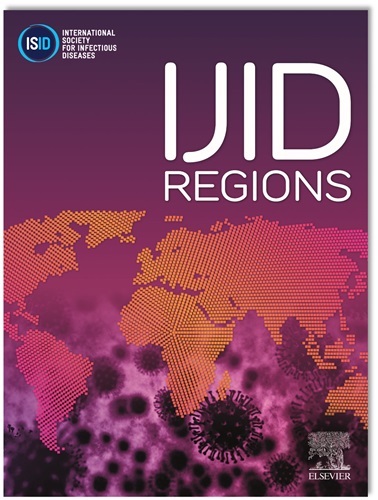Epidemics of Dengue and Reemergence of Chikungunya in Latin America
IF 4.8
2区 医学
Q1 INFECTIOUS DISEASES
引用次数: 0
Abstract
In recent years, Latin America has faced significant challenges due to the epidemics of dengue, the reemergence of chikungunya, and other arboviral diseases. Arboviruses pose a serious threat to public health and have far-reaching socio-economic impacts across the region. In dengue, Latin America experiences cyclical outbreaks of dengue, often exacerbated by factors such as urbanisation, population growth, inadequate sanitation, and climate change. However, in 2023-2024, the region is experiencing the worst and largest epidemics, with particular impact in Brazil, Argentina, Paraguay, and Colombia, among others. Concurrently, in the last few years, the re-emergence of the chikungunya virus in Latin America has added to the burden of mosquito-borne diseases. The first significant epidemic was during 2013-2015 in Colombia, Venezuela, Brazil, and other countries. Now, different countries in the South Cone, such as Argentina, Bolivia, Paraguay and Uruguay, also experience new outbreaks. Several factors have contributed to its resurgence including increased international travel and trade, allowing the virus to spread to new regions; urbanisation and inadequate sanitation, creating conducive environments for mosquito breeding; and climate change, which affects the distribution and behaviour of Aedes. Additionally, the lack of immunity in populations previously unexposed to the virus makes them vulnerable to outbreaks. The impact of such coepidemics extends beyond individual health to affect healthcare systems, economies, and social well-being. Healthcare resources are strained by the influx of patients seeking treatment for dengue and chikungunya-related complications and even chronic disease, leading to overcrowded hospitals and overwhelmed medical personnel. The economic burden is substantial, with costs associated with healthcare, vector control measures, and productivity losses due to illness and disability. Efforts to control and prevent dengue and chikungunya in Latin America require a multi-faceted approach that includes vector control, public health interventions, community engagement, and research into vaccines and treatments. Vector control strategies aim to reduce mosquito populations through measures such as insecticide spraying, larval source reduction, and community education on eliminating breeding sites. Public health initiatives focus on early detection, surveillance, and timely management of cases to prevent severe outcomes and minimise transmission. Community engagement plays a pivotal role in sustainable vector control efforts. It involves educating communities about the significance of personal protection measures, such as using insect repellents and wearing long sleeves and pants, and the importance of eliminating stagnant water sources where mosquitoes breed. Ongoing research into vaccines and treatments for these diseases shows promising developments, offering hope for future prevention and control efforts. In conclusion, the dengue epidemics and reemergence of chikungunya in Latin America present complex challenges that demand immediate and coordinated action at local, national, and international levels.
拉丁美洲登革热流行和基孔肯雅热再次出现
近年来,由于登革热流行、基孔肯雅热和其他虫媒病毒性疾病的重新出现,拉丁美洲面临着重大挑战。虫媒病毒对整个区域的公共卫生构成严重威胁,并产生深远的社会经济影响。在登革热方面,拉丁美洲经历了登革热的周期性暴发,城市化、人口增长、卫生设施不足和气候变化等因素往往加剧了疫情。然而,在2023-2024年,该区域正在经历最严重和规模最大的流行病,对巴西、阿根廷、巴拉圭和哥伦比亚等国的影响尤其严重。同时,在过去几年中,基孔肯雅病毒在拉丁美洲重新出现,增加了蚊子传播疾病的负担。2013-2015年期间,哥伦比亚、委内瑞拉、巴西和其他国家首次出现重大疫情。现在,南锥体的不同国家,如阿根廷、玻利维亚、巴拉圭和乌拉圭,也出现了新的疫情。有几个因素促成了其死灰复燃,包括国际旅行和贸易的增加,使病毒得以传播到新的地区;城市化和卫生设施不足,为蚊子滋生创造了有利环境;以及影响伊蚊分布和行为的气候变化。此外,以前未接触过病毒的人群缺乏免疫力,使他们容易受到疫情的影响。这种共流行病的影响超出了个人健康,影响到卫生保健系统、经济和社会福祉。由于寻求治疗登革热和基孔肯雅病相关并发症甚至慢性病的患者大量涌入,医疗资源紧张,导致医院人满为患,医务人员不堪重负。经济负担是巨大的,成本与医疗保健、病媒控制措施以及因疾病和残疾造成的生产力损失有关。在拉丁美洲控制和预防登革热和基孔肯雅病的努力需要采取多方面的办法,包括病媒控制、公共卫生干预、社区参与以及疫苗和治疗研究。病媒控制战略的目的是通过喷洒杀虫剂、减少幼虫来源和社区教育等措施减少蚊子种群。公共卫生行动的重点是早期发现、监测和及时管理病例,以防止严重后果并尽量减少传播。社区参与在可持续的病媒控制工作中发挥关键作用。它包括教育社区关于个人保护措施的重要性,例如使用驱蚊剂和穿长袖和长裤,以及消除蚊子滋生的死水来源的重要性。正在进行的针对这些疾病的疫苗和治疗的研究显示出有希望的进展,为今后的预防和控制工作带来了希望。最后,登革热流行和基孔肯雅热在拉丁美洲的重新出现构成了复杂的挑战,需要在地方、国家和国际各级立即采取协调一致的行动。
本文章由计算机程序翻译,如有差异,请以英文原文为准。
求助全文
约1分钟内获得全文
求助全文
来源期刊
CiteScore
18.90
自引率
2.40%
发文量
1020
审稿时长
30 days
期刊介绍:
International Journal of Infectious Diseases (IJID)
Publisher: International Society for Infectious Diseases
Publication Frequency: Monthly
Type: Peer-reviewed, Open Access
Scope:
Publishes original clinical and laboratory-based research.
Reports clinical trials, reviews, and some case reports.
Focuses on epidemiology, clinical diagnosis, treatment, and control of infectious diseases.
Emphasizes diseases common in under-resourced countries.

 求助内容:
求助内容: 应助结果提醒方式:
应助结果提醒方式:


